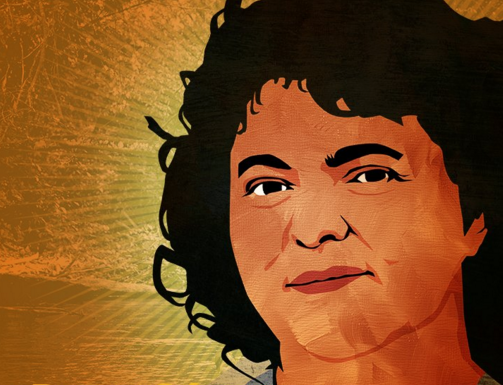Last month, Berta Cáceres, an Indigenous woman from Honduras, was assassinated for her role in the resistance movement against a multinationally-funded project aimed at building a dam on a river that her community, the Lenca, have inhabited, tended to, and fished for hundreds of years. Because Cáceres was an internationally-respected activist and because the murder took place during the U.S. primary season, coverage in the media and outcry from the progressive left has been uncharacteristically intense. Activists, especially Black and Indigenous activists, are threatened or killed in Honduras and throughout Latin America on a regular basis, so what made the Cáceres case any different?
Cáceres' story has resonated with many on the left, especially those who support senator Bernie Sanders, because it can be directly linked to the Democratic party's frontrunner, Hillary Clinton. In 2009, a coup in Honduras ousted left-leaning President Manuel Zelaya, a complicated and less-than-model leader, but one with an agenda that jeopardized U.S. business interests in a country it has long exploited and fashioned into the paradigm of a "banana republic." Drawing a direct line between the subsequent instability in Honduras and the violent repression of activists in Honduras, many in the U.S. are rightfully demanding that then Secretary of State Clinton be held accountable for her role in back-channelling support for a coup in Honduras. Berta Cáceres, just months before her death, implicated Clinton, making the connection all the more transparent.
But that progressives chose this moment to care loudly about the goings on in a region ravaged by decades of U.S. foreign policy is itself violence. The truth is, at its core they primarily seek to weaponize a marginalized group, targets of a 600-year war against Indigenous people, as an anti-Clinton bludgeon. That they can incorporate the death of a Honduran activist into the American electoral discussion is itself a self-serving acquiescence of U.S. neo-imperialism.
A recent report indicates that Latin America is the most dangerous region for environmental activists, with Honduras being the most precarious of all. Activists in the region routinely resist land grabs by multinational logging, mining, and agricultural firms, and in doing so, many of them risk death. The report indicates that almost 75% of the environmental or land activists murdered in 2014 were killed in Latin America, and 40% of those were Indigenous people. For the communities that resist those corporations that come to exploit resources and labor from Latin America, the battle is literally one of life and death.
From Berta Cáceres and the Lenca in south, to the Afro-Indigenous Garifuna community's resistance to displacement on the coast, the struggle in Honduras and throughout Latin America takes many forms, but is always dangerous. Such conditions serve the economic interests of Latin American elites who facilitate policies that disproportionately benefit U.S. corporations by providing raw materials, food crops, and crushingly cheap labor. This violence is manifest in the U.S. through commodities like low-cost clothing, year round access to tropical fruits at affordable prices, and a national addiction to coffee. These arrangements are not new; U.S. neo-imperalism in Latin America dates back at least a century to the Spanish-American war.
We should note that Cáceres' story and those of countless activists killed by state forces, death squads, or gangs throughout Latin America, relates to the U.S. election in much larger way than Hillary Clinton's involvement. The oppression of Latin America's most marginalized people, like that of others around the world, buttresses the standard of living in the United States. These conditions are the price of American comforts furnished by a global system of savagely unequal distribution of wealth and resources. Moreover, there isn't a single candidate running for the nomination from either party that can or will dismantle this system. This includes Sanders, who despite his condemnation of U.S. meddling in Latin American affairs, is also beholden to the fruits of U.S. hegemony. Sanders' politics are not transformative, rather they represent a return to the golden era of the welfare state, which was largely fortified by higher taxation rates and a global system of exploitations.
As it stands, the current choices articulated in the guise of representative democracy and electoral politics are between hard neo-imperialism and soft neo-imperialism, all that separates the two is the language of reform. But both iterations will build dams, will dry up rivers, will consume whole forests, and will displace communities.
To move beyond these limitations, we must reevaluate our conceptions of fairness and engage our personal investments in neo-imperialism. Because power operates not only by the oppression of some, but also by investment in others, so much so, that they cannot imagine a world in which they are not the dominant force.
Hillary Clinton and the Obama administration should be held accountable, but the buck doesn't stop there. When the election has long since been decided, will you forget Berta Cáceres? Will Honduras fade from your mind once it no longer serves an American purpose?
If we truly care for Berta's struggle, it important that we honor others like her and we must do so by treating their communities as fully human and their causes as timelessly relevant. We must not romanticize their struggle, nor decenter their narratives by repurposing the corpses of their fallen into battering rams for our political theater.

